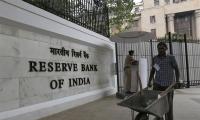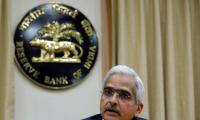Retail Inflation to Average 4.5% in 2024-25: RBI
RBI Deputy Governor Michael Patra projects retail inflation to average 4.5% in 2024-25, aligning with the target by 2025-26. He highlights challenges to inflation targeting from climate change and supply shocks.

Illustration: Uttam Ghosh/Rediff.com
New Delhi, Oct 15 (PTI) The retail inflation is projected to average 4.5 per cent in 2024-25 and align with the target on a durable basis by 2025-26, RBI deputy governor Michael Debabrata Patra has said at a conference here.
The government has tasked the Reserve Bank of India to ensure that consumer price index (CPI) based retail inflation at 4 per cent with a tolerance band of +/- 2 per cent around it.
The inflation has remained below 6 per cent in the last three months.
Retail inflation is projected to average 4.5 per cent in 2024-25 before aligning with the target on a durable basis in 2025-26.
Speaking at the High-Level Conference "Central Banking at Crossroads" organised by the Reserve Bank of India as a part of the commemoration of its 90th year on Monday, Patra also stressed that the Indian experience is unique in view of the incidence of repetitive shocks to food and fuel prices, which challenged the conduct of monetary policy.
In India, price stability is a shared responsibility under which the government sets the target, and the central bank achieves it, Patra said.
This allows monetary-fiscal coordination without posing risks to financial stability, fiscal consolidation or growth - perhaps a template for countries vulnerable to inflationary pressures emanating from supply shocks, he noted.
"It is projected to average 4.5 per cent in 2024-25 before aligning with the target on a durable basis in 2025-26," he added.
Patra also said that in the years ahead, the conduct of inflation targeting (IT) - based monetary policy may face even greater challenges.
Central banks face an existential threat to their central mandates from climate change through supply shocks such as food and energy shortages and a decline in productive capacity.
The RBI deputy governor added that while formulating monetary policy, it is considered good housekeeping to evaluate the balance of risks.
From this perspective, IT policy frameworks of the future need to be more robust, realistic and nimble, while exploiting synergies with prudential, fiscal and structural policies and leveraging, he said.
The government has tasked the Reserve Bank of India to ensure that consumer price index (CPI) based retail inflation at 4 per cent with a tolerance band of +/- 2 per cent around it.
The inflation has remained below 6 per cent in the last three months.
Retail inflation is projected to average 4.5 per cent in 2024-25 before aligning with the target on a durable basis in 2025-26.
Speaking at the High-Level Conference "Central Banking at Crossroads" organised by the Reserve Bank of India as a part of the commemoration of its 90th year on Monday, Patra also stressed that the Indian experience is unique in view of the incidence of repetitive shocks to food and fuel prices, which challenged the conduct of monetary policy.
In India, price stability is a shared responsibility under which the government sets the target, and the central bank achieves it, Patra said.
This allows monetary-fiscal coordination without posing risks to financial stability, fiscal consolidation or growth - perhaps a template for countries vulnerable to inflationary pressures emanating from supply shocks, he noted.
"It is projected to average 4.5 per cent in 2024-25 before aligning with the target on a durable basis in 2025-26," he added.
Patra also said that in the years ahead, the conduct of inflation targeting (IT) - based monetary policy may face even greater challenges.
Central banks face an existential threat to their central mandates from climate change through supply shocks such as food and energy shortages and a decline in productive capacity.
The RBI deputy governor added that while formulating monetary policy, it is considered good housekeeping to evaluate the balance of risks.
From this perspective, IT policy frameworks of the future need to be more robust, realistic and nimble, while exploiting synergies with prudential, fiscal and structural policies and leveraging, he said.
You May Like To Read
TODAY'S MOST TRADED COMPANIES
- Company Name
- Price
- Volume
- Vodafone-Idea-L
- 11.65 (+ 3.56)
- 106772451
- Alstone-Textiles
- 0.28 ( -3.45)
- 44187760
- Mangalam-Industrial
- 0.88 ( -2.22)
- 39177573
- Sunshine-Capital
- 0.27 (+ 3.85)
- 35956340
- GMR-Airports
- 104.40 (+ 6.37)
- 30453005





